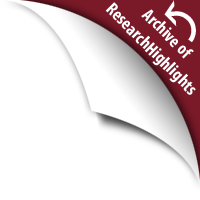

In May 1999 the National Science Board, the governing body of the National Science Foundation, approved a new policy statement on cost sharing. The policy, effective as of the date of approval, directs NSF program officers and reviewers to rank proposals for awards without regard to the level of cost sharing offered by the applicant, as long as the minimum required amount has been met. In other words, as the policy puts it, “NSF-required cost sharing is considered an eligibility rather than review criterion.”
The new policy is designed to remove the impression that proposals might be taken as a sort of “bid,” in other words, that those applicants who offer to put more of their own funding into an NSF-supported project will/could be ranked more favorably on that basis. The board is seeking to ensure that proposals are ranked solely on the quality of the project proposed. As a result, although cost sharing may be discussed and adjusted (with institutional agreement) during the course of negotiating an award, it may not be discussed as part of the evaluation of proposals.
To reinforce the point, the new policy also requires that the level of cost sharing be clearly stated in the announcement, with specific language outlining the level of cost sharing required for eligibility. As clarified in the Grant Proposal Guide, some level of cost sharing is statutorily mandated: a minimum of 1 percent on a project or of the aggregate cost of all NSF-supported projects subject to statute. All unsolicited proposals to NSF are covered by this requirement. Other NSF programs, especially programs supporting infrastructure enhancement or those likely to generate income, may specify a higher level of cost sharing. Such programs are usually announced via individual documents and will in future (as some have already) specify the cost-share requirements in Section B under “Proposal Preparation and Submission Instructions.” In all cases, once eligibility is met, cost sharing is not to be an aspect of proposal review.
For the text of this policy and a FAQs sheet related to it, http://www.nsf. gov/bfa/cpo/policy/start.htm
NSF has just published a new Grant Proposal Guide (GPG) and the forms to accompany it. NSF 00-2, the GPG, and NSF 0-3, the forms kit, will be in effect October 1, 1999, and will supersede the previous Grant Proposal Guide and forms.
The new GPG does not differ drastically from last year’s version. Most changes are to clarify and update FastLane information. One substantive change does concern the makeup and structure of the required biographical sketch: information is to be arranged in the categories of professional preparation, appointments (in reverse chronological order), publications, synergistic activities, and collaborators and other affiliations. Synergistic activities specifies a list of up to five examples to demonstrate the individual’s activities focusing on integrating and transferring knowledge, as well as creating it. Please see Section D.6.d in the GPG for clarifying examples.
For those submitting proposals via FastLane, the new forms are not of particular concern because FastLane forms are automatically aligned with the GPG. Those applicants submitting proposals in hard copy, however, should be certain to use the new forms, which have bar codes to assist NSF in storing documents electronically.
To download copies of NSF 00-2, the GPG, go to http://www.nsf.gov/cgi-bin/getpub?nsf002. For the forms, NSF 00-3, go to http://www.nsf.gov/cgibin/ getpub?nsf003. Or you may link from the Office of Research and Sponsored Programs homepage.
The Agency for Health Care Policy and Research (AHCPR) in June announced in the NIH Guide that it is not currently using the Modular Grant Application and Award. Applicants to AHCPR should ignore application instructions concerning the modular initiative and instead prepare applications according to instructions provided in PHS 398 (revised 4/98). AHCPR is studying the use of modular application and award; any change in policy will be announced through a Notice in the NIH Guide. For the text of the June announcement, see http://www.nih. gov/grants/guide/notice-files/not99-101.html
The U.S. Department of Agriculture has issued this year’s program announcement for its National Research Initiative Competitive Grant Program (NRICGP). Projects proposed under the NRICGP must address key problems of national and regional importance to agriculture, forestry, and related sciences. Fundamental and mission-linked research is solicited in the areas of biological, environmental, physical, and social sciences relevant to agriculture, food, and the environment. Please note that deadlines vary by research area and by type of award. See this month’s Deadlines section for USDA NRICGP deadlines coming up in November. The announcement is available at http://www.reeusda.gov/nri
Employees paid from funds granted from the U.S. Department of Defense are subject to the requirements of a specific Drug-Free Workforce Policy. For awards (including contracts and grants) from DoD, this policy replaces the Drug-Free Workplace Policy required of all organizations working with the federal government. The DoD Drug-Free Workforce Policy prohibits the use of controlled substances both on and off duty.
As regards employees paid from DoD funds, UM reserves the right to identify illegal drug users, including testing on a controlled and carefully monitored basis. UM also requires supervisors to discuss this policy with all employees working on DoD-funded contracts and grants. Copies of the policy are available from department chairs and supervisors, the Department of Human Resources, and the Office of Research and Sponsored Programs.
UM employees who are considering preparing a UM proposal to the Mississippi Arts Commission (MAC) are urged to check first with the Office of Research and Sponsored Programs to determine whether the institutional limit has already been met. MAC specifies that applicant organizations may submit only two grants per fiscal year: one operating or project grant (March 1 deadline) and one minigrant (quarterly deadlines). For MAC guidelines, http://www.arts.state.ms.us/grants-frm.html.